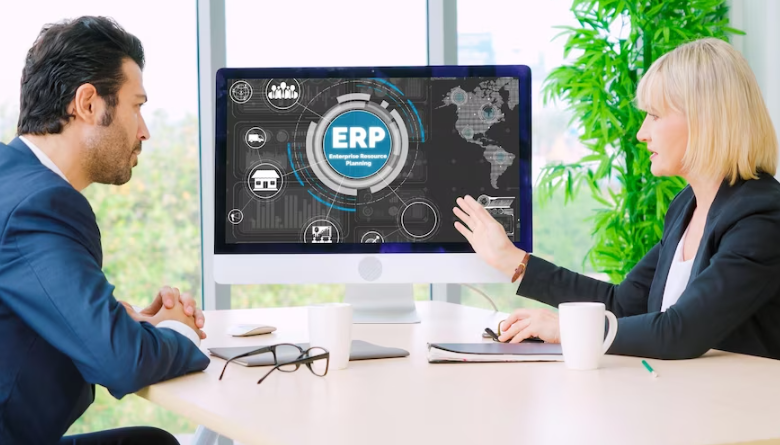ERP, or Enterprise Resource Planning, for small businesses refers to software solutions that integrate various essential functions within a company into a single system. These functions commonly include aspects like accounting, human resources, inventory management, customer relationship management, and more. The primary goal of ERP for small businesses is to streamline operations and enhance efficiency by providing a centralized platform that allows easy access and management of crucial business data. These systems cater to the specific needs of smaller enterprises, helping them better manage resources, make informed decisions, and optimize their overall business processes.

ERP for Small Businesses: Empowering Efficiency and Growth
Running a small business comes with its unique set of challenges, especially when it comes to managing operations, resources, and making informed decisions. Enterprise Resource Planning (ERP) solutions have emerged as game-changers, even for smaller ventures, offering a unified platform to streamline various processes.
Introduction to ERP for Small Businesses
In essence, ERP refers to a suite of integrated applications that assist in managing a company’s core business processes. For small businesses, these systems provide a comprehensive solution, integrating facets like finance, HR, inventory, supply chain, and customer management into one cohesive platform. The importance of ERP for small businesses cannot be understated.
Benefits of ERP for Small Businesses
Efficiency and Streamlining Operations
ERP systems bring a level of efficiency that is transformative for smaller enterprises. By automating tasks and centralizing data, businesses can operate more seamlessly, reducing manual efforts and errors.
Cost Savings and Resource Management
Small businesses thrive on effective resource management. ERP systems help in better resource allocation, reducing unnecessary costs and optimizing operations.
Improved Decision-Making
Having real-time access to critical business data enables small business owners to make informed decisions promptly, fostering agile and effective decision-making processes.
Implementing ERP Systems
Selecting the right ERP system is crucial for small businesses. It involves finding a system that aligns with the business needs and goals. Training and integration also play a vital role in ensuring a smooth transition and utilization of the system.
Challenges and Solutions in ERP Adoption for Small Businesses
Cost Challenges
One of the primary hurdles for small businesses is the cost of implementing an ERP system. However, various affordable options cater specifically to the needs of smaller enterprises.
Resistance to Change
Implementing new technology can often face resistance from employees. Proper training and highlighting the benefits of ERP systems can help overcome this challenge.
Customization and Flexibility
Small businesses often require customization and flexibility in their systems. Many ERP solutions now offer tailored options for smaller ventures.
Success Stories: Small Businesses Utilizing ERP
Several small businesses have embraced ERP systems and witnessed substantial growth and efficiency. Case studies of successful implementations offer valuable insights and inspiration for others.
Future Trends in ERP for Small Businesses
The landscape of ERP for small businesses is evolving. Technologies like AI, machine learning, and cloud-based solutions are revolutionizing ERP, offering scalability and adaptability.
Conclusion
In conclusion, ERP systems are no longer exclusive to large corporations. Small businesses can significantly benefit from these systems, enhancing efficiency, decision-making, and resource management.
FAQs (Frequently Asked Questions)
- Are ERP systems affordable for small businesses?
- Yes, there are tailored and cost-effective ERP solutions available for smaller ventures.
- How long does it take to implement an ERP system for a small business?
- Implementation time varies based on the complexity and size of the business, but it can range from a few months to a year.
- Can employees easily adapt to ERP systems?
- With proper training and highlighting the benefits, employees can adapt to ERP systems effectively.
- Are ERP systems scalable for growing businesses?
- Yes, many modern ERP systems offer scalability, catering to the growth of small businesses.
- Do ERP systems provide data security for small businesses?
- Yes, most ERP systems come with robust security measures to protect sensitive business data.
Pcode Show: